The Faculty of Arts is proud to support our faculty in their research and scholarship.
Our 2017-2018 series has come to a close. Please stay tuned for the next round of talks!
Previous Lectures from this Series
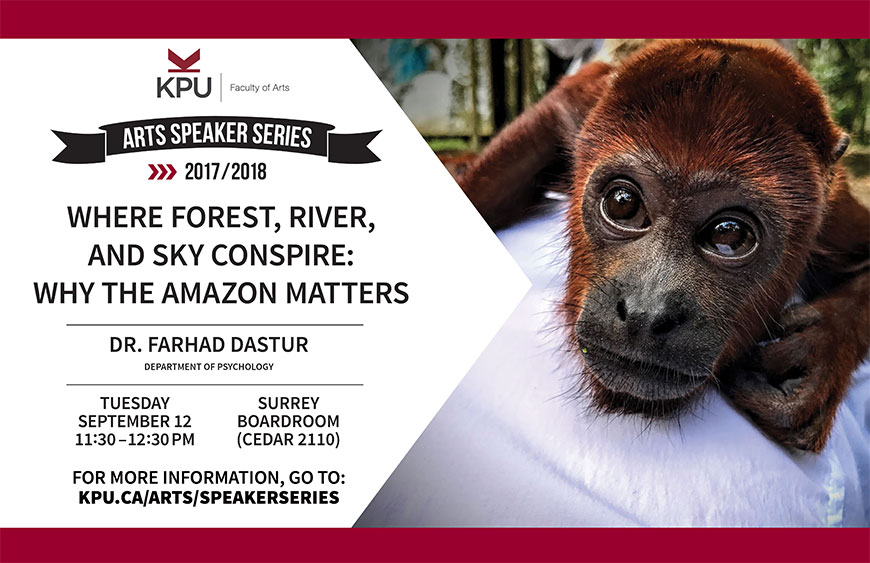
September 12, 2017 – Tuesday, 11:30-12:30pm, Farhad Dastur, Department of Psychology
"Where Forest, River, and Sky Conspire: Why the Amazon Matters"
The Amazon is the greatest expression of Earth’s imagination. Here we witness evolution’s genius for design and the limitless solutions to the existential problems of survival. These creative forces allow an insect to mimic a plant and a plant to mimic an insect. Here, forest, river, and cloud conspire to create the world’s most diverse ecosystem: home to 2.5 million insect, 40,000 plant, and 1,300 bird species. Here flows one fifth of the planet’s fresh water in a river so great that it dilutes the Atlantic Ocean over 100 km out to sea. Here, every year, falls 27 million tons of phosphorous dust carried on winds from the Sahara. Who knew that deserts could fertilize jungles? Some of the rainforest’s 3,000 fruits could enrich our diets, delight our palates, and provide health benefits, while Amazonian botanicals may be cures for a range of ailments. The indigenous cultures of the Amazon are equally important and magnificent. Archaeological evidence places humans in the Amazon 11,000 years ago. Indigenous cultures like the Watoto, Makuna, and Yanomami are just a few of the 200 tribes inhabiting the forest. Seventy-seven of these tribes have had little or no contact with the outside world. What wisdom, knowledge, and stories do they possess? Sadly, all this biological and cultural diversity are under threat. The Amazon is now 20% smaller than it was 40 years ago, the consequence of a perfect storm of climate change, colonialism, corruption, unsustainable development, deforestation, cattle ranching, and industrial farming. Given the Amazon’s immense biological and cultural significance, and the answers it holds to the problems of both today and tomorrow, we are compelled to ask: What would it mean if we lost the Amazon?
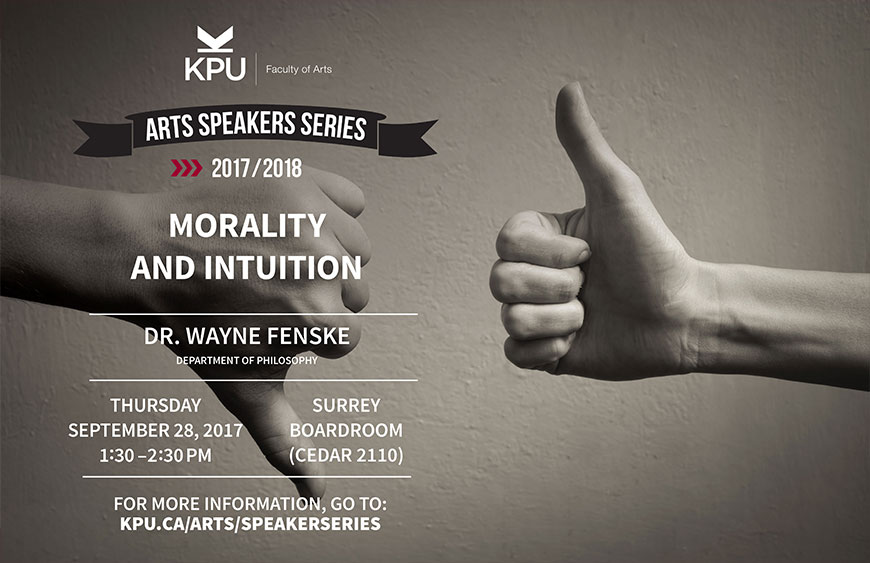
September 28, 2017 – Thursday, 1:30-2:30pm, Wayne Fenske, Department of Philosophy
"Morality and Intuition"
A number of recent philosophers cite evidence from experiments carried out by moral psychologists to argue that it is a mistake to rely on our intuitions as a source of moral insight. After briefly describing the particulars of some of these experiments, I will summarize the argument against relying on intuition in moral deliberation that these philosophers take to follow from such experimental results. I will then point out shortcomings with this interdisciplinary case against moral intuition in an attempt to convince the audience that using intuitions as a source of moral insight is not only appropriate, but also unavoidable.
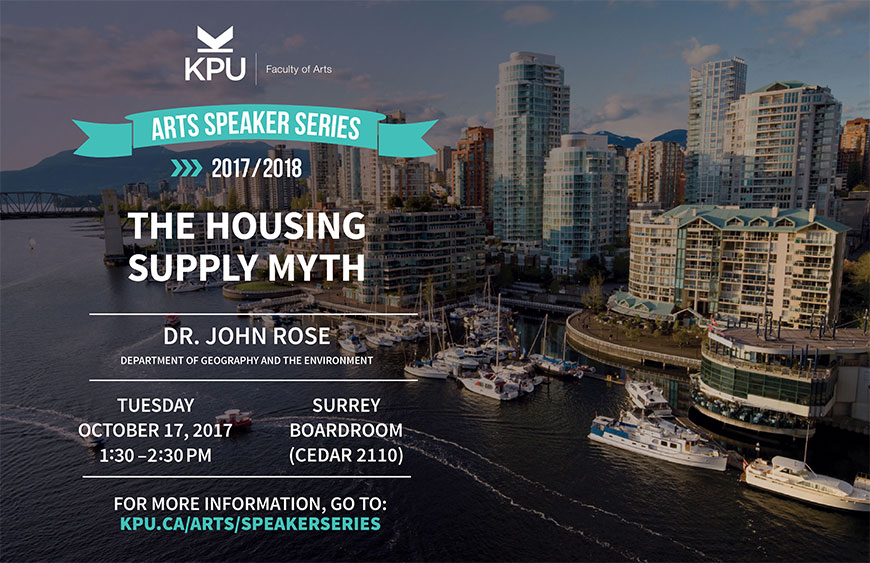
October 17, 2017 – Tuesday, 1:30-2:30pm, John Rose, Department of Geography
"The Housing Supply Myth"
In major metropolitan centers such as Vancouver, rapidly escalating house prices have led to numerous concerns about housing affordability. This phenomenon has also given rise to various explanations, both demand and supply focused, for rising housing costs in these cities. This presentation critically examines one such account, the ‘housing supply myth’, which asserts that escalating house prices are the product of governmental regulations which have restricted the supply of housing units in select cities.
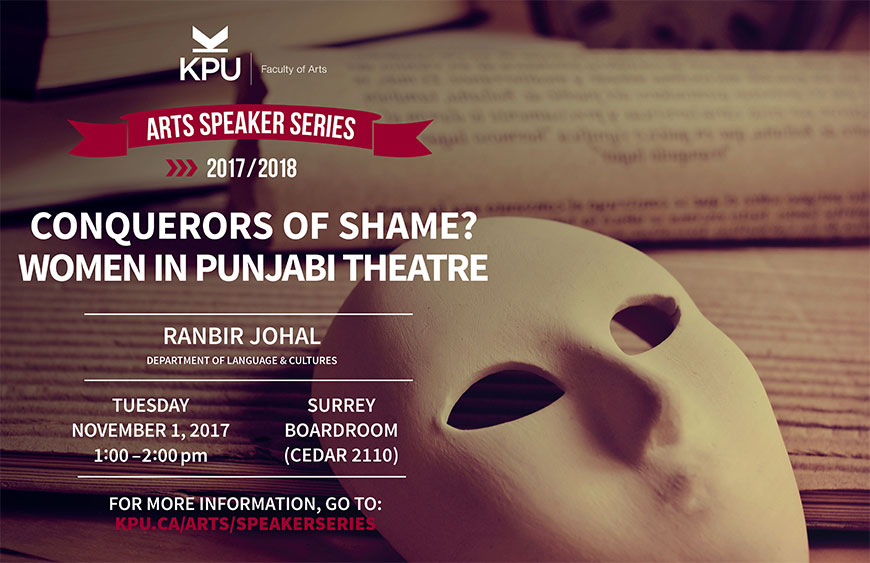
November 1, 2017 – Tuesday, 1:00-2:00pm, Ranbir Johal, Department of Languages & Cultures
"Conquerors of Shame? Women in Punjabi Theatre"
As a Punjabi playwright, I was always struck by the paradoxical nature of Punjabi theatre. The plight of women was a favourite subject matter amongst early Punjabi playwrights but women themselves were absent on and behind the stage. The dominance of men in the theatre and the strong presence of the affect "shame" within the Punjabi community may have contributed to the silencing of women’s voices. However, a handful of women have been able to create a niche for themselves in this male dominated genre. Rani Balbir Kaur, Neelam Mansingh Chaudhury, Navnindra Behl and Neena Tiwana are four women who have contributed greatly to Punjabi theatre. Understanding what has allowed these women to enjoy success in a field that has largely excluded females was the central concern of the research I conducted from February to April of 2017 when I interviewed these women to collect their oral histories.
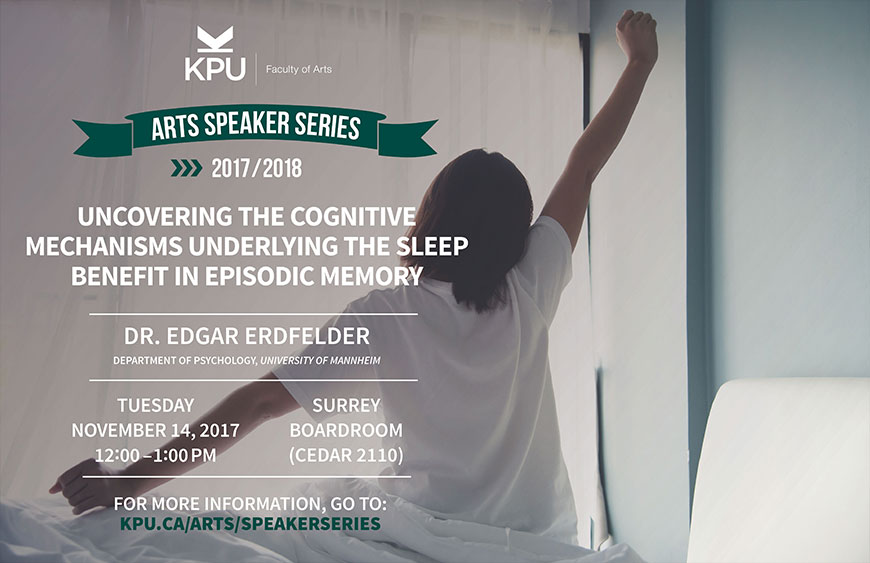
November 14, 2017 – Tuesday, 12:00-1:00pm, Edgar Erdfelder, University of Mannheim
"Uncovering the Cognitive Mechanisms Underlying the Sleep Benefit in Episodic Memory"
After sleep, individuals recall more information learned prior to sleep than after an equally long period of wakefulness. Whereas early accounts attributed this sleep benefit to passive shelter effects of sleep (less retroactive interference), more recent research suggests active benefits of sleep (active memory consolidation). A third possible explanation maintains that sleep plays no causal role at all with respect to episodic memory. According to this explanation, phase-shifted circadian rhythms for encoding and retrieval can account for the results. I will first show that previous attempts to test these explanations are less convincing than previously thought. Next, I propose the Encoding-Maintenance-Retrieval (EMR) multinomial model to test these explanations. The EMR model provides uncontaminated measures of successful encoding of word-pair associations (parameter e), maintenance of encoded associations across the retention interval (parameter m), and (c) successful retrieval of stored associations (parameter r). I will then report two studies in which the time of learning (9h am vs. 9h pm), the length of retention (5 minutes vs. 12 hours) and ease-of-retrieval (recall with vs. without retrieval cues) were manipulated experimentally. The results converge in showing that sleep has two beneficial effects on memory: Sleep boosts maintenance of stored associations in memory (m) – an effect of memory consolidation – and, in addition, it also improves retrieval of stored associations from memory (r) – probably an effect of release from retroactive inhibition. Theoretical implications will be discussed.
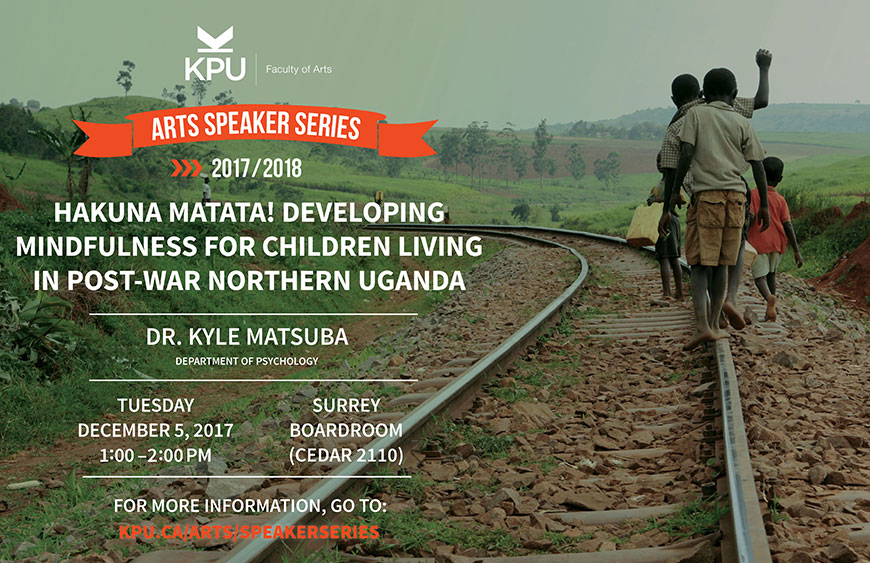
December 5, 2017 – Tuesday, 1:00-2:00pm, Kyle Matsuba, Department of Psychology
"Hakuna Matata! Developing Mindfulness for Children living in Post-War Northern Uganda"
Growing up in northern Uganda is not easy. It’s a poor region that lacks many resources, infrastructure and educational opportunities, thus putting children at risk for physical and psychological health-related issues, as well as academic failure. In this talk, we discuss our attempt to address some of these issues through the implementation of a school-based mindfulness program. We share some of the challenges we faced in implementing the program along with the stories of success. Finally, we contemplate the future of these children and the hope that we have.
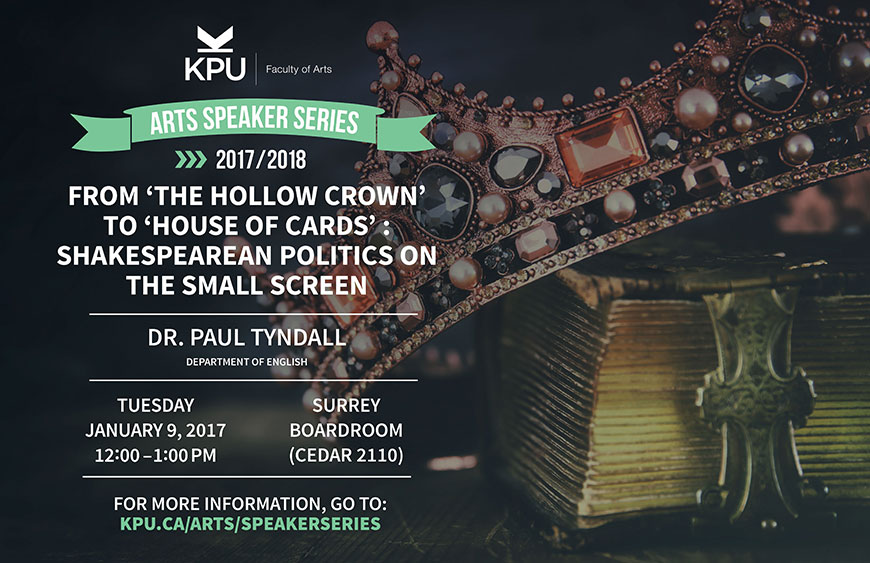
January 9, 2018 – Tuesday, 12:00-1:00pm, Paul Tyndall, Department of English
"From 'The Hollow Crown' to 'House of Cards': Shakespearean Politics on the Small Screen"
During the 1590s, William Shakespeare wrote a series of plays dealing with one of the most turbulent periods in late medieval history, the period from the deposition of Richard II in 1399 to the death of Richard III at the Battle of Bosworth in 1485. While the plays looked back to the fifteen century, they also spoke to the political uncertainties and anxieties of his own time. Moreover, these plays have continued to resonate with modern readers and audiences. In this lecture, I plan to discuss three particularly memorable television adaptations/appropriations of Shakespeare's history plays, BBC's "The Hollow Crown," HBO's "Game of Thrones" and Netflix' "House of Cards."
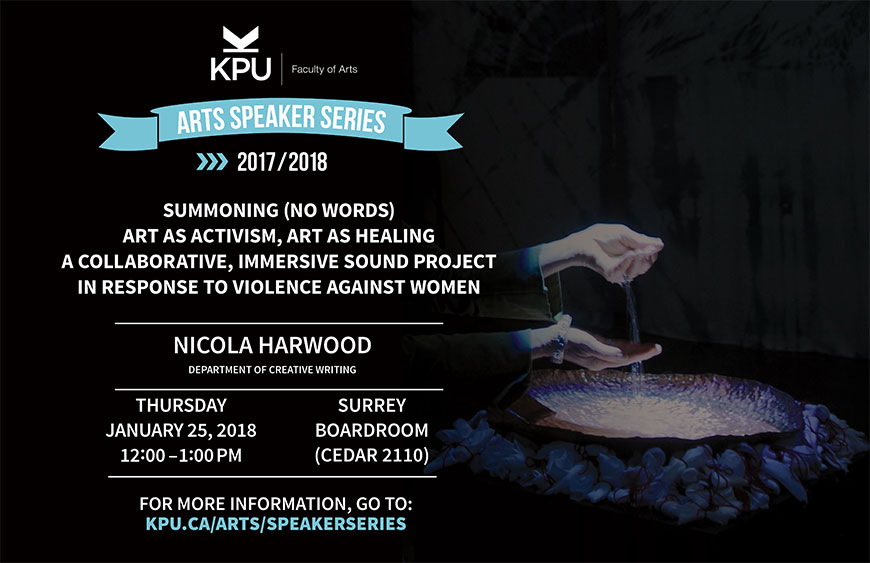
January 25, 2018 – Thursday, 12:00-1:00pm, Nicola Harwood, Department of Creative Writing
"Summoning (No Words). Art as Activism, Art as Healing. A collaborative, immersive sound project in response to violence against women"
Creative Writing and IDEA instructor Nicola Harwood will present on her project Summoning (No Words). Summoning (No Words) is an interactive and immersive sound installation built from the female voice. The project is a response to violence against women and is created from the voices of women programmed into motion sensors and activated through viewer movement in a darkened exhibition space. The soundscape is built from sung compositions created by a seven member team of Canadian female vocalist/composers of different traditions including Allison Girvan (Classical, World), Andrea Menard (Jazz, Metis, Cree), Bessie Wapp (Eastern European, Ladino), Mutya Macatumpag (Filipino, Contemporary), Sandy Scofield (Jazz, Contemporary, Plains Cree), Tanya Tagaq (Inuit Throat Singing, Experimental), Vandana Vishwas (Classical Indian). Spoken audio has been contributed from community members including many KPU students and faculty. The project has been supported by a KPU Creative Capital grant as well as a 0.6% release. The Creative Capital grant has supported two KPU student researchers, Justin Bige and Mikayla Fawcett who performed community outreach and production assistance. The project had its premiere at Oxygen Art Centre in Nelson, BC in September and was then mounted at the Heart of the City Festival in downtown Vancouver in October.
The web portal for the project is: www.summoning.ca
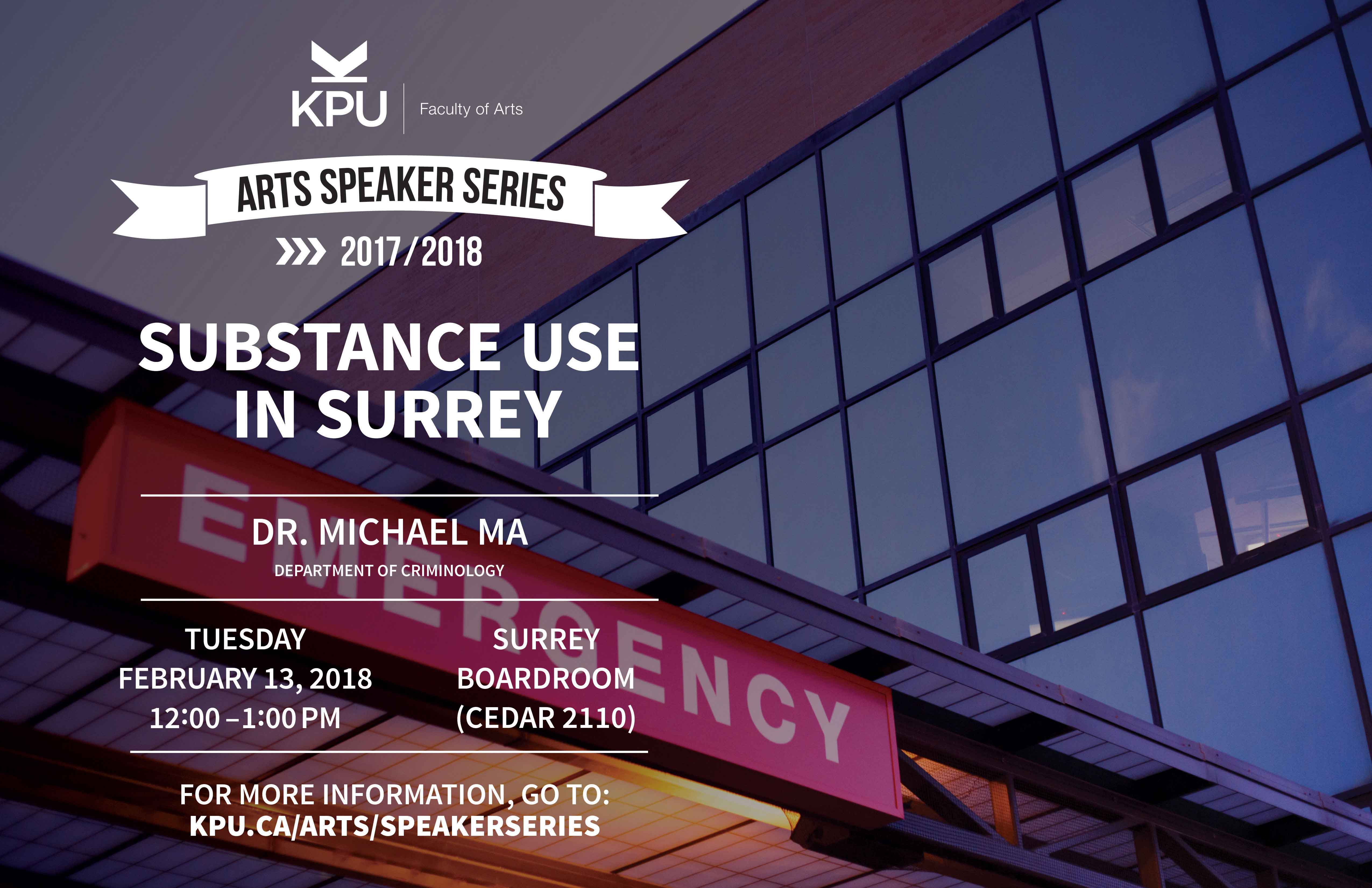
February 13, 2018 – Tuesday, 12:00-1:00pm, Michael Ma, Department of Criminology
"Substance Use in Surrey"
The BC Coroners Service has reported over 400 overdose deaths in the first four months of 2017. The province is now on track to surpass the 922 overdose deaths of 2016. This is a staggering number of overdose deaths that has garnered much local and national attention. The presence of fentanyl and carfentanil –newer synthetic opiods-- has also been wildly reported as being the cause of much of these overdoses as they are rapidly introduced into the illicit drug market. However, in the context of current research on substance use in BC, the main academic focus remains on the Downtown Eastside in Vancouver. Although most overdoses took place in Vancouver, Surrey, and Victoria, which saw overdose death increases of 60%, 42%, and 267% respectively, the main research focus remains Vancouver and the Downtown Eastside (BC Coroners Service 2017). Little has been published on the patterns of use in Surrey or Victoria. Although it has been reported that fentanyl/carfentanil is the culprit we know very little of its patterns of use in Surrey, BC. This research talk provides preliminary results of a survey designed to understand the patterns of substance use and some of the effects of the adoption of harm reduction strategies in Surrey. This research project expands the empirical knowledge of the patterns of illicit drug use in Surrey and helps shed much needed light on the neglected area of Surrey, BC.
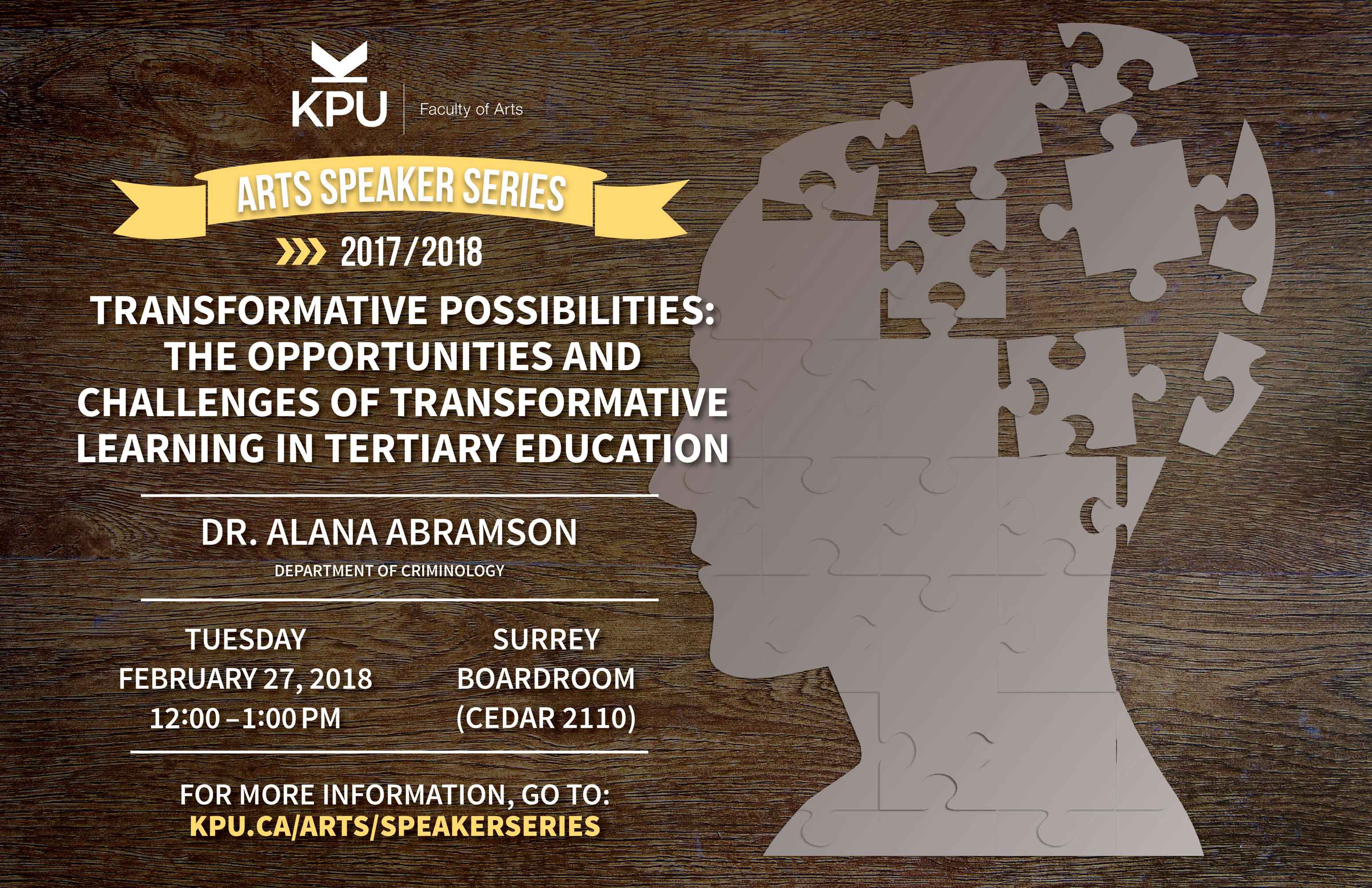
February 27, 2018 – Tuesday, 12:00-1:00pm, Alana Abramson, Department of Criminology
"Transformative possibilities: The opportunities and challenges of transformative learning in tertiary education"
Transformative learning theories and practices are becoming more widely discussed in the academy. Movement away from didactic teaching methods creates opportunities for creativity, engagement, empowerment, and, critical reflection by both students and teachers. Drawing from her research and experience teaching Criminology, Alana Abramson will explain transformative andragogy and the impact such approaches have on students’ beliefs, feelings, relationships, and actions. While transformative learning techniques have demonstrated sustainable and critical shifts in student's perspectives and behaviour, these approaches challenge both invisible and visible structures within post-secondary institutions. Barriers to implementing transformative learning will be discussed along with suggestions on how they might be overcome.

March 20, 2018 – Tuesday, 1:00-2:00pm, Aaron Goodman, Department of Journalism & Communication Studies
Responding to Canada's Opioid Overdose Crisis: Participatory Interactive Documentary & Collaborative Testimony
Canada is facing an unprecedented and growing opioid crisis. In 2016, at least 2,458 people across the country died from opioid-related overdoses. B.C. is Canada's worst-affected province with nearly 1,000 deaths in 2016. In spite of these deaths, there have been few public memorials for overdose victims. Families of those who have died often feel a sense of shock, grief and shame which leads many to stay silent. Meanwhile, photojournalists and mainstream news organizations frequently represent overdose victims and drug users in stigmatizing ways and this is shaping public memory about the situation. This research-creation project aims to amplify the voices and experiences of overdose victims and their families. The methods include slow transmedia journalism, oral history recording and testimony production with individuals who have been directly impacted by the opioid crisis. This project builds on a Katalyst-funded study titled The Outcasts Project (www.outcastsproject.com) (2014-15) which focused on humanizing long-term and vulnerable heroin users in Vancouver's Downtown Eastside through documentary photography and photo-elicitation.
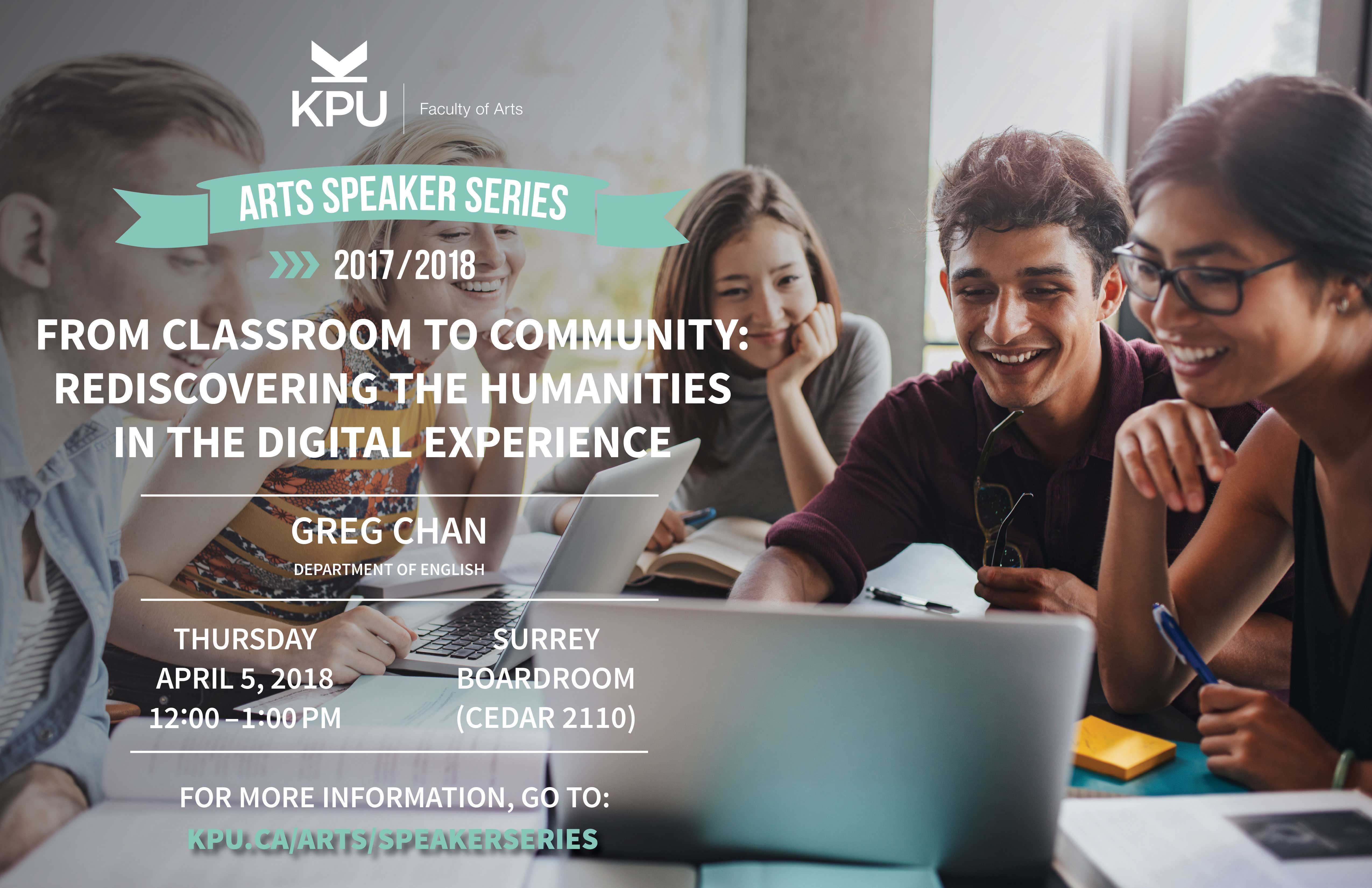
April 5, 2018 – Thursday, 12:00-1:00pm, Greg Chan, Department of English
"From Classroom to Community: Rediscovering the Humanities in the Digital Experience"
As post-secondary educators, we often hear those buzz terms: Experiential learning. Communities of practice. Digital humanities. Service learning. Meeting students where they are. While they sound like good ideas in a conference keynote or at a professional development session, how do we make them a reality back in our classrooms? This talk will demonstrate how these concepts can become a meaningful and integral part of a faculty member’s teaching, research, and service. Three case studies will be discussed: the development and launch of Mise-en-scène: The Journal of Film & Visual Narration, KPU’s open-access film studies journal; the creation of the KDocs Community Outreach Program; and the teaching of ENGL 4300: Writing and Persuasion Beyond the Classroom (Summer 2016) as a digital humanities experiment.